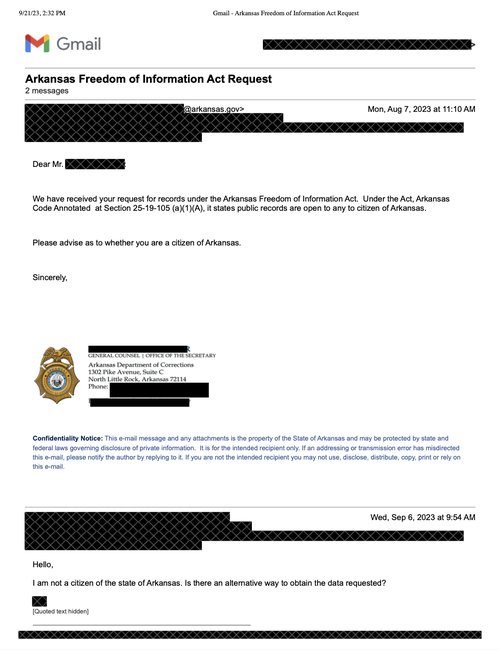DataArkansas
Inadequate Data
to perform any analysis.
| Request Responsiveness | |||||
| Financial Accessibility | |||||
| Timeliness | |||||
| No Residency Required | |||||
| Appeal Responsiveness |
*These factors track the process--i.e. the effort and obstacles--for obtaining data from individual states under the Freedom of Information Act (FOIA) request and appeals process. These factors do not measure the quality of the data; only the process of attempting to obtain the data.
Data Status
-
Residency
The person filing the request must be a legal resident of Arkansas
-
$150
Cost to request information
We were not able to attain any data from Arkansas. Arkansas erects significant obstacles to requesting and receiving any data, including a residency requirement–i.e. that the person filing the request be a legal resident of Arkansas–and high cost of $150.
Arkansas never responded to us on any alternatives for requesting data outside of residency requirements, and even for those who meet the residency requirement, Arkansas exacts significant costs, including the “actual costs of mailing or faxing or emailing the records” with a baseline copy charge of $25.
Although we attempted to use publicly available web portals to identify individuals incarcerated under felony murder, as in most other states, Arkansas does not have a statute specifically codifying felony murder, which would make it easier to identify and isolate felony murder conviction data. Instead, as in most other states, felony murder is defined with its other murder statutes and the publicly available conviction and sentence information did not distinguish felony murder from other murder convictions.
"Please advise as to whether you are a citizen of Arkansas."
Legal Overview
In Arkansas, felony murder is defined in both first (Ark. Code Ann. § -5-10-102) and capital murder statutes. (Ark. Code. Ann. § 5-10-101). The degrees of murder depend on the seriousness of the underlying felony: prosecutors can charge first degree murder for any underlying felony, while capital murder requires prosecutors to prove the commission of only certain more severe underlying felonies.
Prosecutors can charge and convict any person of first degree and capital murder without having to prove that they intended to cause another person’s death, but do have to prove that during the commission of another felony, either the person or their accomplice exhibited a “extreme indifference to the value of human life” (first degree). Prosecutors can prove first degree murder even when the death was caused by a third non-party (i.e. neither the person nor their accomplice).
People charged with felony murder in Arkansas can raise an “affirmative defense” that they weren’t the one who committed or aided in the commission of the homicide to defend against a capital murder prosecution, or in the case of first degree murder charges, additionally weren’t armed, and “reasonably believed” that no other participant was armed or “intended to engage in conduct that could result in death or serious physical injury.“ Affirmative defenses, however, are extremely difficult to prove.
A conviction for felony murder carries a sentence of life without parole or death (capital murder), or 10-40 years, or life (first degree murder).
Access the Data
Learn more about how you can contribute to transparency when it comes to felony murder.
